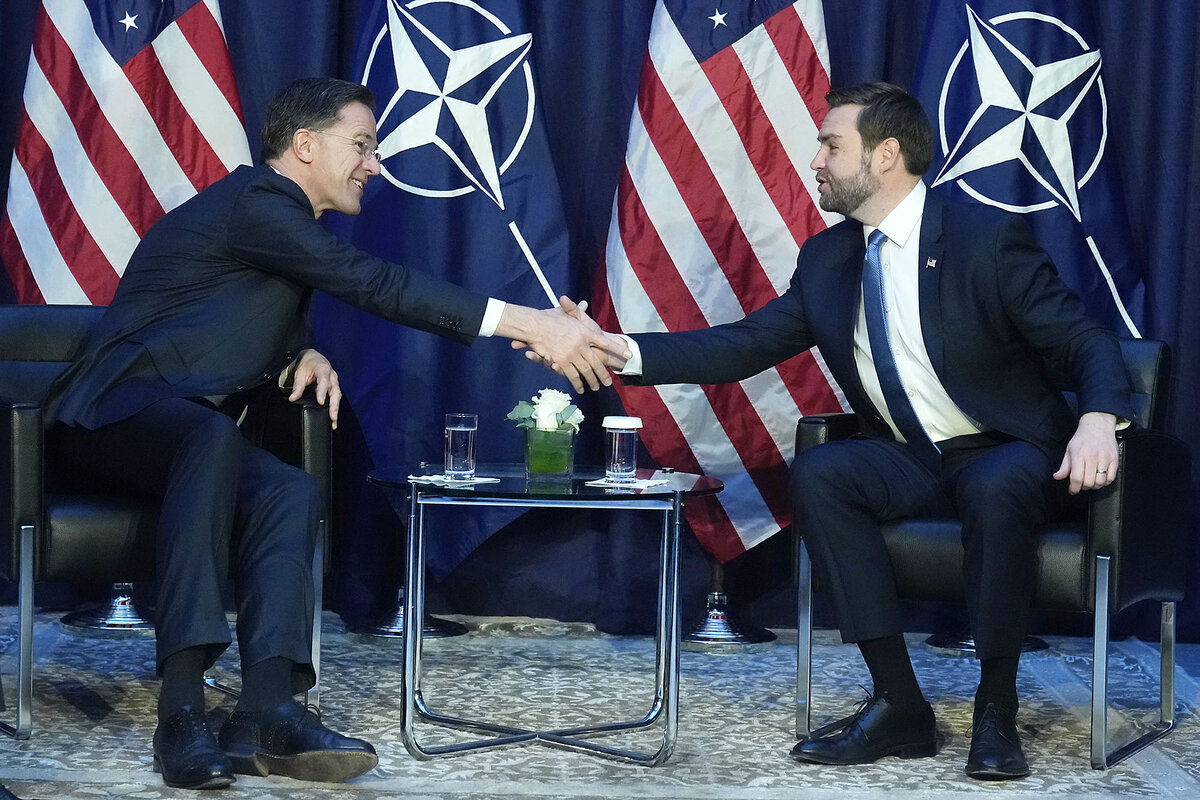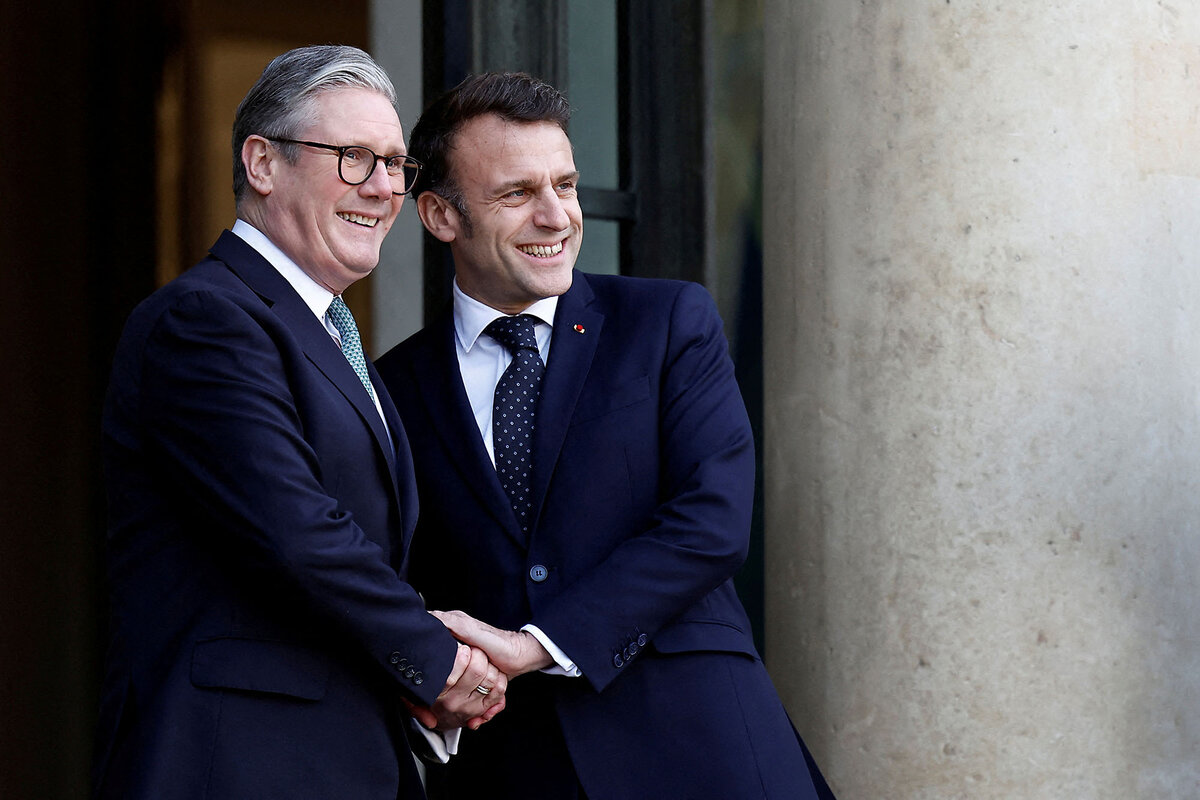Stuck outside Ukraine talks, Europe begins reassessing its relations with US
Loading...
| Basel, Switzerland
Europe is in disarray. U.S. President Donald Trump’s decision to initiate bilateral talks with Russia to end the war in Ukraine has sidelined Kyiv and other Western stakeholders.
And Europe, a key American ally in global affairs since World War II and a partner supporting its neighbor Ukraine, is wondering how to respond.
“Europe’s security is at a turning point,” European Commission President Ursula von der Leyen wrote on the social platform X as European leaders met in Paris Monday. “Yes, it is about Ukraine – but it is also about us. We need an urgency mindset. We need a surge in defense. And we need both of them now.”
Why We Wrote This
The United States appears to be abandoning European security from its list of priorities, even negotiating a Ukraine peace deal without Europe’s input. The shift has European leaders scrambling to find new ways to protect the continent.
French President Emmanuel Macron convened a crisis meeting while Saudi Arabia geared up for the first U.S.-Russia official talks since the war on Ukraine began. What alarms European officials is not just their exclusion from these talks, but also the undiplomatic way the United States has deprioritized European security.
Europeans are digesting a series of unpalatable announcements. Last Thursday, President Trump held a long call with Russian President Vladimir Putin and unilaterally declared the start of Ukraine peace talks. Since then, the U.S. administration has ruled out NATO membership for Ukraine, suggested Russia could keep territory it has taken since 2014, and insisted that Europeans – not American troops – will provide security guarantees to any eventual agreement.
Mr. Trump’s approach to deal-making fails to impress Europeans.
“It is clear that any deal behind our backs will not work,” warned top European Union diplomat Kaja Kallas at a Brussels gathering of NATO and Ukrainian officials. “You need the Europeans; you need the Ukrainians. Why are we giving them [Russia] everything they want even before the negotiations have started? It’s appeasement. It has never worked.”
Ukraine President Volodymyr Zelenskyy stressed there “can be no talks on Ukraine without Ukraine.” Ukrainians still face daily attacks from Russia. They also recall giving up their nuclear arsenal in 1994 in return for security guarantees from the U.S., the United Kingdom, France, China, and Russia. Such promises failed to deter Russia from seizing territories in 2014 and invading in 2022.
Europe could also be directly impacted by the U.S.-Russia talks if Mr. Trump decides to offer up concessions to Russia regarding U.S. commitments to Europe, noted Jana Puglierin, senior policy fellow of the European Council on Foreign Relations, in an email. That could include changes to “the stationing of American troops and weapons systems in Eastern Europe or a Russian veto on further NATO enlargement.”
Former U.S. Ambassador John Bolton, who served as White House national security adviser during the first Trump administration, shares the European sense of alarm. “Trump’s treatment of Putin takes him out of the category of pariah and for all intents and purposes makes Putin a legitimate ruler of a legitimate state again,” he told The Christian Science Monitor.
“It gives Putin something that he very much wants, which is to negotiate directly with Trump, not with Zelenskyy, not with Europeans, not with others because Putin believes correctly that he will get more out of Trump,” added Mr. Bolton. “They have created a formula for negotiations that could have been written in the Kremlin.”
Former French Prime Minister Dominique de Villepin agrees. “Everyone now in Europe knows that we cannot call, anymore, the U.S. an ally of the Europeans,” he told journalists in Paris. “This is a huge change.”
For European leaders, the key question now is how to boost defense capabilities – quickly – and make their voice heard on Ukraine. Decisions to ramp up defense spending would only yield results in a couple of years. And Washington wants to know what security guarantees Europe could deliver now.
“Not only are the Americans pushing for a ceasefire, but they are also pushing for a ceasefire without the inputs from European allies and Ukraine, which indicates how little regards Washington has for its allies,” says Jean-Marc Rickli, head of global and emerging risks at the Geneva Centre for Security Policy. “For European security, that is one of the most important crises since the Second World War.”
A European-only security guarantee is possible, says Sven Biscop, director of the Europe in the World program at the Egmont Institute in Brussels. But it would need to clearly signal to Russia that war would be declared if it invades Ukraine a third time. “You make it credible by predeploying a sizable force behind the Ukrainians,” he says. “Fifty thousand troops: We can do that, but it will be a stretch in terms of available manpower that requires combat readiness.”
European leaders in Paris failed to agree on a response to the U.S.-Russia talks. That’s in keeping with questions of defense in Europe. As of now, Germany, Spain, Italy, Denmark, and Poland are unwilling to send troops to Ukraine in the event of a ceasefire. Only the U.K. signaled it is willing to do so provided there is a U.S. backstop. France has not yet officially stated its position.
“This lack of unity is clearly not the best way for the Europeans to try to weigh on the negotiations between the U.S. and Russia starting today in Saudi Arabia,” says Dr. Rickli. “This conflict has turned into a power game. Unfortunately, the Europeans do not have enough power to weigh in.”
Monitor special correspondent Colette Davidson contributed reporting from Paris.








